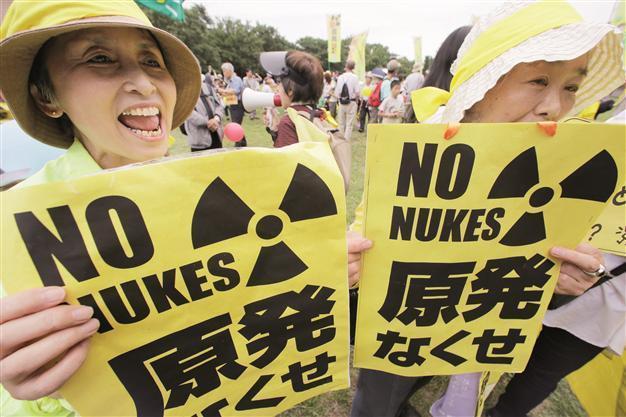Japan works on new strategy amid growing energy shortage
ISTANBUL - Hürriyet Daily News

Women shout slogans at a rally against restarting the Ohi nuclear plant’s reactors in Tokyo. Japan has approved bringing the country’s first reactors back online since last year’s earthquake led to a nationwide shutdown. AP photo
As Japan moves out of a large energy gap due to the closure of 52 nuclear plants and fresh risks of decreased oil from Iran, the country prepares to restructure its energy strategy in a document set to be released in August, according to a foreign ministry official.“Japan has learned a big lesson from the devastating earthquake and tsunami disaster last year,” said ministry spokesperson Masaru Sato, who was in Istanbul to join the Non-Proliferation and Disarmament Initiative (NPDI) meeting hosted by Turkey.
“Nuclear power plants cannot be 100 percent safe,” he said. Some private Japanese companies, however, might still eye sharing in building nuclear plants outside Japan, including in Turkey, he also said.
The state controlled Tokyo Electric Power Company (TEPCO) had earlier announced that it withdrew from a Turkish nuclear plant building tender. Turkey aims to build 23 units of nuclear energy generators by 2023, Energy Minister Taner Yıldız said earlier this month.
Arms exports ban lifted
Responding a question at a meeting with journalists over the weekend, Masaru said Japan’s recent decision to lift a self-imposed ban on arms exports was a peaceful one.
Previously Japan had to continually make exemptions to the ban, but the decision last December changed the way the decades’ old principle is implemented, he said.
A rising demand had been effective in creating such a decision, he said. However, Japanese arms exports will be linked to “peace keeping efforts and counter-terrorism” every time, he said.
The official illustrated the issue with coast guard boats sold to Indonesia. “Security on Indonesian coasts is important for Japan since it stands on the route of our energy imports,” he said.
Japan imports some 85 percent of oil and gas from Gulf nations, but Asia’s second largest economy is dropping acquisition form Iran to avoid U.S. sanctions on the Islamic nation.
Turkey and Japan gained an embargo exemption along with India, Malaysia, South Africa, South Korea, Sri Lanka and Taiwan.
Looking for oil suppliers
Japan has dropped fuel purchase from Iran down to about 9 percent and with recently enacted measures and the drop will continue, Masaru said. On Iran ties, he said Japan attached a great importance to the issue. “We think that pressure should be placed on Iran. However, we also believe that talks with Iran should continue,” he said.
To compensate the drop in Iran imports, Japan is in talks with Saudi Arabia and Qatar, the official said.
However, the capacity of these two Gulf countries to meet the demand is doubtful as many countries, including Turkey, have already turned their faces to the large oil exporters.
The Japanese government is rather hopeful for their new strategy, to be revealed in a document released later this year in August.
Energy consumption, where Japan has a good efficiency record, energy production and energy storage would be the document’s main three topics, Masaru said. Resuming operation of nuclear plants, but with enhanced security standards was on the agenda, he said, adding that the strategy would support a green economy.
Japan approved the resumption of operations at two reactors at a nuclear plant in Ohi in the western part of the country on June 16.
















